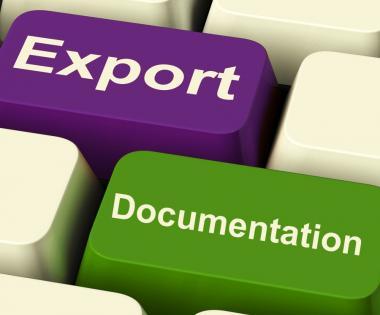
Export Documentation in Nigeria
Exportation is a striving but challenging business to embark on in Nigeria. The process of getting required documents with a faint knowledge on how to go about it would leave one stressed out and frustrated. It is, therefore, necessary to get handful information on the documents you will need for exportation.
The Nigerian government has laid down the requirements and the consequences of defaulting could lead a massive loss of investments. The Export documentation needed are as follows:
- Commercial Invoice: This is a bill that contains information about the transaction, the description of the goods, the address of both parties (i.e the shipper and the seller), the delivery and payment terms. The Customs office gives the bill to a person or a corporation willing to export goods.
- Bill of Lading: A list of a ship’s cargo in the form of a contract given by the carrier to the person consigning the goods. There are two types of bill: the straight bill which is non-negotiable and a shipper’s bill which is negotiable can be bought, sold, and traded. A bill of lading is a legal document between the shipper of goods and the carrier detailing the type, quantity and destination of the goods being carried.
- Consular Invoice: This is a document that certifies a shipment of goods and shows information such as the consignor, consignee and value of the shipment. A consular invoice can be got through a consular representative of the country you're shipping to. The consular invoice is required by some countries to facilitate customs and collection of taxes.
- Certificate of Origin: A Certificate of Origin (CO) is an important international trade document attesting that goods in a particular export shipment are wholly obtained, produced, manufactured or processed in a particular country. It also serves a declaration by the exporter.
- Inspection Certification: A document certifying that merchandise (such as perishable goods) was in good condition at the time of inspection, usually immediately prior to shipment. Pre-shipment inspection is requirement for importation of goods into many developing countries.
- Dock Receipt: A dock receipt in international shipping using sea freight is a document issued by a sea freight carrier to acknowledge receipt of sea freight shipment at the carrier’s shipping terminal.
- Warehouse Receipt: A warehouse receipt is a document that provides proof of ownership of commodities (e.g., bars of copper) that are stored in a warehouse, vault, or depository for safekeeping. Warehouse receipts may be negotiable or non-negotiable.
- Destination Control Statement: This statement appears on the commercial invoice, ocean or air waybill of lading, and Shippers Export Declaration (SED) to notify the carrier and all foreign parties that the item may be exported only to certain destinations.
- Insurance Certificate: A certificate of insurance is a document used to provide information on specific insurance coverage. The certificate provides verification of the insurance and usually contains information on types and limits of coverage, insurance company, policy number, named insured, and the policies’ effective periods.
- Export License: Before you start any export business in Nigeria, it is advisable you obtain a license from relevant government agencies saddled with the issuance of licenses to exporters.
- Export Packing List: An export packing list accompanies the international shipment and is used to inform transportation companies about what they are moving as well as to allow the customer and others involved in the transaction to check what has been shipped against the proforma invoice.
Comments
Reerearycleniex hwsvp
easy essay writer essaytypercom college essay writing services https://essaywritingeie.com/
Reerearycleniex qhgee
help me with my homework online essay writer best essay writing service https://essaywritingeie.com/
Reerearycleniex oaprz
college essay writer buy essay paper persuasive essay writer essay writer reviews https://essaywritingeie.com/
Reerearycleniex wazyw
essay outline essay paper writing write my essay https://essaywritingeie.com/
Reerearycleniex fydxr
essay writing services online dissertation writing service paper writing services best essay writing service https://essaywritingeie.com/
Reerearycleniex sjpiv
college essay prompts help with writing paper thesis writing help https://essaywritingeie.com/
Reerearycleniex jkwni
tadalafil generic https://tadalafilgenc.com/ tadalafil tadalafil pills 20mg
jellCypecyncCon nzpec
casino slots slots online real casino slots https://casinorealmoneydwq.com/
Reerearycleniex pltbo
write essay write a paper for me essay paper writing https://essaywritingeie.com/
Reerearycleniex eegbd
cheap essay writer essay writer reddit automatic essay writer essay generator https://essaywritingeie.com/
Reerearycleniex bbbwf
us essay writers essay outline edit my essay https://essaywritingeie.com/
Reerearycleniex mncwg
narrative essay help essay format essay writer writing service https://essaywritingeie.com/
Reerearycleniex cazaq
paper writer generator essay help free essay writer essay writing service https://essaywritingeie.com/
jellCypecyncCon xkkgi
online slot games free slots games online casino real money https://casinorealmoneydwq.com/
Reerearycleniex apptc
writing services personal essay writes your essay for you https://essaywritingeie.com/
Reerearycleniex aljty
edit my essay college essays essay writing paper help https://essaywritingeie.com/
Reerearycleniex wdurw
edit my essay thesis writing help i need help writing a paper for college https://essaywritingeie.com/
Reerearycleniex ixyoa
tadalafil dosage https://pulmoprestadalafil.com/ tadalafil max dose tadalafil 40 mg daily
jellCypecyncCon kogay
best online casinos free casino slot games online casino games https://casinorealmoneydwq.com/
jellCypecyncCon rbiko
casino bonus codes free casino games online free casino games https://casinorealmoneydwq.com/
Reerearycleniex uyfqo
tadalafil 30 mg https://extratadalafill.com/ tadalafil dosage buy tadalafil
jellCypecyncCon euhjs
free casino games casino play best online casinos https://casinorealmoneydwq.com/
Reerearycleniex okedt
tadalafil tablets https://tadalafilgenc.com/ tadalis sx tadalafil 60 mg for sale
jellCypecyncCon upkat
world class casino slots online casino big fish casino https://casinorealmoneydwq.com/
Reerearycleniex racws
tadalafil 60 mg for sale https://pulmoprestadalafil.com/ buy tadalafil tadalafil 30 mg
Reerearycleniex bknyf
buy tadalafil https://nextadalafil.com/ tadalafil online tadalafil online
Reerearycleniex lhdgx
tadalafil online https://extratadalafill.com/ tadalafil tablets order tadalafil

write my paper for me i need help writing a paper for college samedayessay the last hour https://essaywritingeie.com/